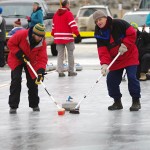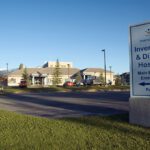Home »

Democracy is alive at Wasa
By Nowell Berg
A second public meeting regarding re-zoning bylaws that would see a 120-unit RV Park built at Wasa took place January 24.
Regional District of East Kootenay (RDEK) representatives on the public hearing panel included City of Kimberley Mayor Don McCormick, Electoral Area E Director Jane Walter, RDEK Staff Jean Terpsma and Michele Bates.
The meeting drew over 50 residents who assembled to hear Mr. Tom Kiy present his plans for a 23-hectare parcel of land currently zoned for a golf course campground combination. Under existing zoning, the golf course would need to be built first before a campground could be developed.
Kiy has applied to the RDEK to make changes to the Wasa OCP that would amend the current C-6 zone, Golf Course Commercial, to C-1, Highway Commercial zone. This change would allow for a variety of commercial uses and future sub-division. Commercial uses would include a grocery store, gas station and post office as well as a campground and horticultural uses. Under the C-1 zoning, no golf course would be required.
The first stage of Kiy’s plan is to build a 120-unit RV Park which could include up to 24 cottages along with a disc/frisbee golf area and kids bike park. The plan would also include one distributed water system and one septic sewer system. Further, the zoning request would allow for future land sub-division of up to six parcels of two hectares each.
Similar to the August 2016 public meeting that considered the same amendments to the Wasa OCP, Wasa residents raised many concerns:
What is the volume of water being withdrawn from groundwater resources?
What is the volume of discharge from the septic system and will the system be protected from flooding?
What is the environmental impact caused by the increase in people, cars, boats and ATVs on the lake?
Who is responsible to prove or demonstrate there would be no or limited impact to the water supply? Is it the applicant or the RDEK?
Will Interior Health inspect the septic system on a regular basis?
What about the safety of vehicles and pedestrians crossing Highway 93/95 to access the lake?
How will the increase in ATVs and off-road vehicles impact natural areas and backcountry around the lake?
Many Wasa business owners, but not all, were in attendance and voiced support for changes to the OCP and building of the RV Park. The business owners who spoke said Mr. Kiy’s project would increase tourist and summer season population providing economy benefit for the whole community. One business owner said water consumption would be far less than that of a golf course and another indicated that crossing the highway should not create any safety issues.
One long-time resident suggested that each RC site pay the same “mosquito tax” that all residences pay each year. Another resident suggested that a “fence” be constructed between the RV Park and the highway to prevent park residents from cut across the highway.
After a lengthy question and answer session, Jane Walter called the public meeting to order.
Ms. Terpsma read out the guidelines for making a statement at the public meeting. She also informed the audience the RDEK had received 10 letters regarding the OCP bylaw changes. Eight were opposed and two supported the project.
One support letter was contingent upon there being a noise restriction imposed from 10 p.m. until 7 a.m. The second support letter proposed a staged development process allowing 60 RV sites to be developed and the remainder at a later date.
One of the letters opposed to the development came from Canadian Pacific Railway (CPR). In the CPR’s document sent to the RDEK, it states “The railway opposes all residential development adjacent to railway lands as it considers residential, directly adjacent to the railway’s heavy industrial operations, to be not compatible adjacencies.”
The document further states, “The health, safety and welfare of individuals could be adversely affected by railway operations, activities, sounds, noises and vibrations.” For safety reasons CPR “recommends that no dwelling should be built within 75 metres of railway lands.” It is not known if any RV sites would be within this boundary.
The first person to make a statement at the public hearing was Cliff Youngs, Wasa Lake Land Improvement District (WLLID)chair. He noted the WLLID’s position asks the RDEK to “postpone” any decision as there was insufficient information on impacts to the lake and the “issues raised had not been addressed.” While the WLLID is not opposed to development per se, any development must be done with the “health of the lake a major concern.”
Another resident and WLLID Trustee, Laurence Kay, noted the RDEK Staff Report “stressed commercial development over environmental concerns.” He opposed the bylaw amendment because the RDEK does not have “sufficient information and data to make the decision.” He pointed out the RDEK board’s decision must be “consistent with the Wasa OCP.”
In his statement, Jim Abbot said the proponent, Mr. Kiy, was “disadvantaged by the RDEK process” because the RDEK did not communicate sufficient information on the project and issues raised by residents such that it “creates suspicions” that are unfounded because they are based on a lack of information.
A Wolf Creek Road resident made a statement regarding the increasing pressure on the area backcountry from excessive ATV and off-road vehicle use. She reported seeing, this past summer, ATVs “tearing up grassland, harassing elk and leaving garbage around.” She hoped that if the RV Park went ahead the RDEK would step up enforcement of current ATV regulations.
Susanne Ashmore indicated she was in favour of the RV Park. She said that Wasa “community needs to deal with its issues” like outdated septic systems around the lake before criticizing Mr. Kiy. She said, “Give Tom the benefit of the doubt” and that Wasa should get its “own house in order.”
Three business owners, Jack Davis, Jim Howard and Steve Wilson, all stood to support the RV Park project. Mr. Davis said he thought “the aquifer would not be damaged by the RV Park.”
Mr. Howard “disputed” the notion an increase in population and ATVs would have a negative impact on the lake. He said, there would be “no impact on water” and pointed out the old greenhouse used lots of water in the past.
Mr. Wilson point out the RV Park would “bring more people” to the area, but suggested that “not everyone goes to the lake everyday.”
Penny Flegal stated she was concerned about increased litter and fire safety. She said Wasa has “no fire protection” and the RV Park would increase the number of bonfires and potential for a wild fire to threaten existing residences.
Tanya Monroe stressed the “need for a younger generation” to reside at Wasa that could be spurred on by “more business.” She wants to see “more people come back to the community.”
While I have written of my opposition to the proposed Wasa OCP bylaw amendments, I must say that having over 50 people at the public meeting was a sign that democracy is alive at Wasa. I appreciate Mr. Kiy presenting information and answering questions. I have tried to present the content of the meeting as balanced and accurate as possible. Scribbling notes while people express their opinion is a daunting task at best.
My impression of the meeting was that people want information about the environmental impact of the RV Park on the aquifer and most importantly, the lake. While trying to determine with 100% accuracy the complete environmental impact on the lake is not possible, it’s important for Mr. Kiy to demonstrate the RV Park won’t create the negative impacts residents are concerned about, particularly one that he has a direct impact on – the aquifer.
This should also be a wake-up call to the RDEK board and staff that they must adhere to all policies in the Wasa OCP and not cherry pick the ones that promote commercial development while neglecting environmental and groundwater policies. As the governing body responsible for by-law changes and re-zoning at Wasa, the RDEK board must not blindly pass motions without as much scientific data as possible.
The RDEK board votes on the Wasa OCP bylaw amendments at its next meeting on February 10 at 9 a.m.
Lead image: Jean Terpsma, RDEK (left), Michele Bates, RDEK, Kimberley Mayor Don McCormick, Area E Director Jane Walter and Mr. Tom Kiy (standing). Nowell Berg photo







